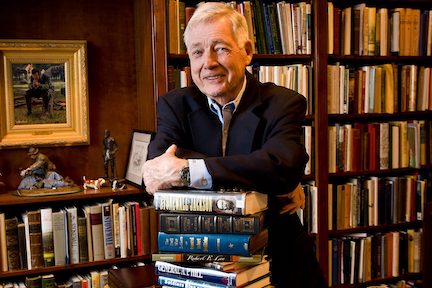Bud Robertson: In Memoriam (part one)

Like so many Civil War historians of my generation, I first knew James I. “Bud” Robertson, Jr., as the talking head on Civil War Journal. With his distinctive drawl, the silver-haired Virginia Tech professor lent color and personality to the Arts & Entertainment network documentary series that I consumed each morning before heading off to school. With a glint in his eye, he rehearsed in vivid color the feats of Confederate generals—the same men he brought to life on the page.
Years later, I got to know and spend some time with “Bud” Robertson. In 2013, we both spoke at a Civil War symposium in Washington, D.C. Our host tasked me with reflecting on Civil War memory in light of the ongoing sesquicentennial commemorations. I dutifully prepared remarks that reflected on the shortcomings of previous anniversaries—completely unaware that Bud, who had served as executive director of the United States Civil War Centennial Commission, would be on the program that afternoon. To say the least, it was a humbling experience. Yet Bud was amiable and gracious. He was the very picture of a gentleman scholar, and we shared a memorable dinner together that evening.
In mourning this enormous loss for the Civil War community, some commentators will doubtless pronounce Bud’s death the “end of an era.” But I want to emphasize what may well go unsaid this week: Bud Robertson presaged important developments in our profession. For one, he embraced his role as a public historian decades before “public history” was a field. Like his longtime colleague William C. “Jack” Davis, he was a storyteller at heart. Bud understood that the public had an innate curiosity about the past that could only be satisfied with well-crafted narrative prose. He knew almost instinctively how to produce empathy for the people of the past. He made his readers and listeners care about the past because he made history what it is–urgently and vividly human.
Those of us who ride the roundtable circuit know just how profoundly Bud’s work moved public audiences. Few of us will ever approximate the reach and genuine respect that he commanded. Roundtable presentations, appearances at symposia, radio spots and television commentary annexed significant amounts of his time; he cared much more about reaching the public than he did about historiographical debates. While best known for his mammoth biography of Stonewall Jackson, Bud authored coffee-table books, battlefield guides, and illustrated histories for National Geographic, aiming to introduce (and re-introduce) his subject to a wider reading public.
Bud Robertson’s work was more than a trove of anecdotes about Confederate generals, though it is sometimes caricatured that way. He was thinking and writing about the Civil War as a lived experience long before social historians finally “won” the Civil War. He published an important book on the experiences of common soldiers many years before scholars revived the subfield pioneered by his mentor Bell Irvin Wiley; he likewise produced a modern unit history (a superb book on the Stonewall Brigade) a half century before others in the field endeavored to “revive” the genre.
Bud’s Civil War had plenty of drums and bugles, but also its fair share of anguish and loss. In 2015, he contributed a poignant essay on the image of a dead horse at Antietam to Gary Gallagher and Matt Gallman’s collection on Civil War photographs. And he plumbed the “human side of war” at length in his 2011 volume, The Untold War. He was working with non-textual sources before the history of material culture; thinking about the consequences of the war before the “dark turn”; and writing about human responses to war before the history of emotions.
With the death of Bud Robertson, our profession has lost a good, kind man and a generous, talented scholar. While loving remembrances will regard Bud as a “traditional” historian—and in many respects, he was—let us also remember that in not insignificant ways, he was well ahead of his time.
I have a fond memory about Dr. Robertson. I had an esoteric question about Stonewall Jackson, and I remembered Dr. Robertson’s epic biography of Jackson. I wondered if he’d answer my question for me? I found his e-mail, e-mailed him—and he replied politely and fully, within an hour.
Fair winds and following seas, sir. I’m glad you won’t be here to see them tear down Stonewall’s statues in Charlottesville and on Monument Avenue in Richmond.
I also have a fond memory of Dr. Robertson. He spoke at the Southern Maryland Civil War Round Table 5 years ago. As part of the evening’s festivities, the Virginia Tech Alumni Association and the officers of the Round table took him and his wife to dinner prior to his lecture. I had the distinct honor and pleasure to sit next to him at dinner and listen as he discussed any topic that came his way, as well being to able to ask a few questions of my own. An evening I shall never forget. He was a fine gentleman. Farewell Dr. Robertson!
I too, am very sad to hear of the passing of Dr. Robertson. My only connection with him was at a lecture that he gave at Sharpsburg to commemorate the 150th anniversary of the battle of Antietam. After his talk was finished, I walked up to the podium and asked him to autograph my copy of his stellar biography on Stonewall Jackson. He very graciously signed it with the following: “To Ted-
With all good wishes- James L. Robertson, Jr.” This book and his autograph are one of my treasured possessions. May he Rest In Peace.
Ted Romans
Well stated tribute, Mr. Jordan. Thank you.
What a wonderful tribute to a gentleman scholar. His writing reaches the heart and soul and he will be missed. Just as Stonewall did… he has crossed over the river.
He was a treasure and will be missed. Thank you for writing this tribute.